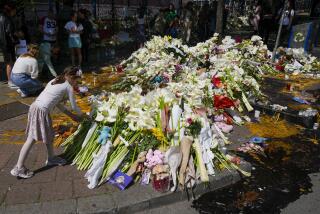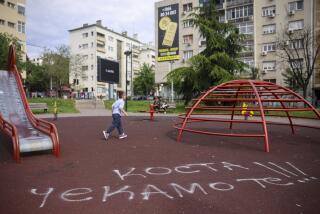Attack Kills 5 Youths as Bosnia Army Closes in on Breakaway Muslim Chief : Violence: Rebel leader Fikret Abdic’s yearlong hold on Bihac pocket seems near an end. It is unclear who fired mortars that struck schoolyard.
- Share via
SARAJEVO, Bosnia-Herzegovina — Two mortar rounds struck a schoolyard in northwestern Bosnia on Saturday, killing five children and wounding seven, as a yearlong battle between government forces and a renegade Muslim businessman in the region pressed to a close.
The mortar attack being investigated by French soldiers of the U.N. Protection Force occurred in the town of Skokovi, which was recently recaptured by government troops as they advanced on the last stronghold of rebel Muslim leader Fikret Abdic.
It was unclear who fired the two 120-millimeter rounds that killed the children, U.N. spokesman Maj. Dacre Holloway said.
He alluded to a confused and desperate situation in the northwestern region known as the Bihac pocket, where Abdic last September declared his own republic and laid siege to the rest of the government-held territory sandwiched between Serb-occupied regions of Croatia and Bosnia-Herzegovina.
Officials from the U.N. mission’s headquarters in Zagreb, Croatia, were at work negotiating a surrender and safe evacuation of Abdic supporters as the attack on the schoolyard occurred.
Government troops were within half a mile of his hilltop stronghold and advancing quickly, U.N. officers said. But Abdic has refused to give up.
“It’s academic. He’s finished,” Holloway said. “It’s just a matter of his prolonging the agony.”
Hundreds of troops on both sides of the Muslim-versus-Muslim battle have been killed over the past month.
Because Skokovi is now in government hands, suspicion about the origin of the deadly mortar rounds rested on the last Abdic fighters or the Croatian Serb insurgents who have been supporting them from across the border.
But Holloway said the mortar rounds were thought to have come from the northwest, from an area already in government hands, adding to the uncertainty about the culprits’ identity.
More than 300 cars full of people trying to flee Abdic territory ahead of what they feared would be a government onslaught crossed into Serb-held Croatia early Saturday, Holloway said.
A spokesman for the Office of the U.N. High Commissioner for Refugees here, Peter Kessler, said nearly 2,000 people were massed at the Bosnia-Croatia border.
“There is a lot of fear and instability,” Kessler said of the fleeing Muslims, some of whom had backed Abdic in return for food obtained through black-market connections and U.N. assistance.
If the government troops succeed in quelling Abdic’s insurgency, they would be able to divert forces to the larger battle against Serbian rebels who have already conquered and occupied 70% of Bosnia.
Bosnian Serbs, spread thinly over the mass of territory they have taken, have lately lost ground to the strengthening government forces. They have been hampered by a blockade imposed by Serb-led Yugoslavia, which wants the rebels to sign a peace treaty that would end the fighting while allowing half of Bosnia to become a Serbian fiefdom.
More than 200,000 people, mostly Muslim civilians, are dead or missing since Serbs rebelled against Bosnian independence in April, 1992.
More to Read
Sign up for Essential California
The most important California stories and recommendations in your inbox every morning.
You may occasionally receive promotional content from the Los Angeles Times.














